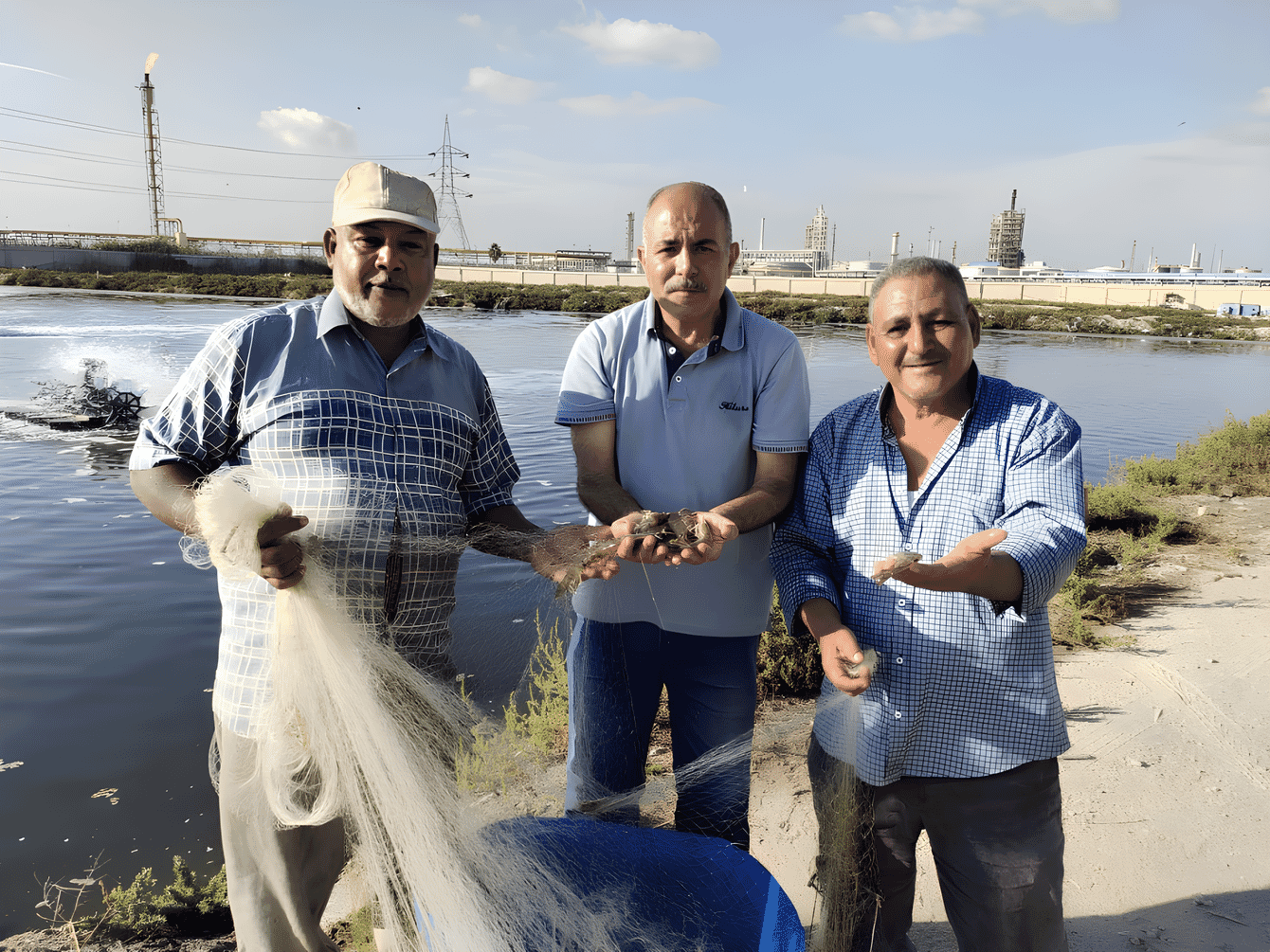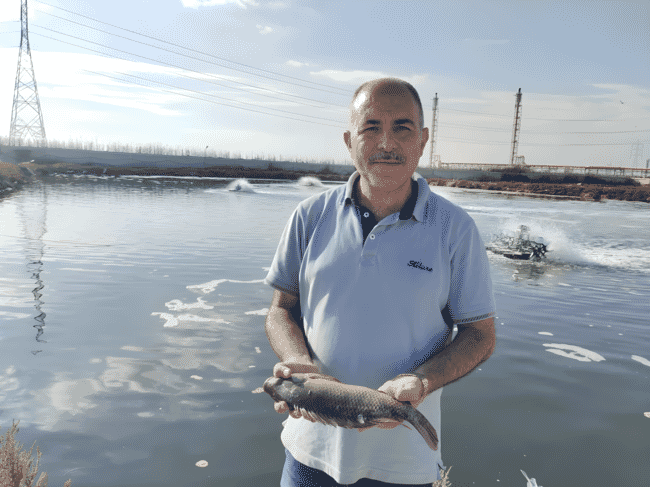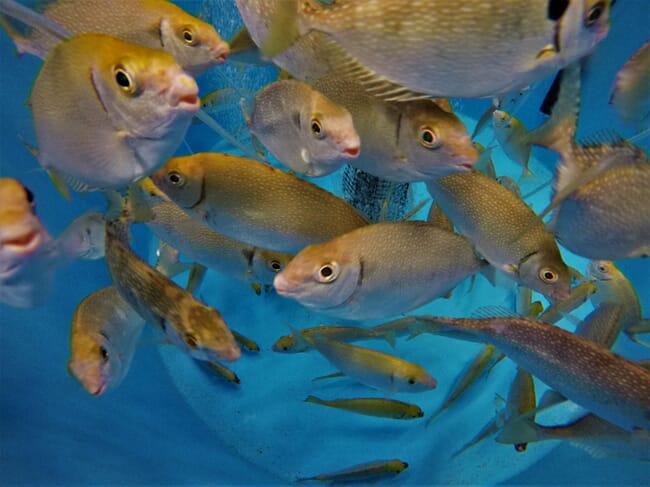
Producing shrimp inland is widely possible in Egypt, thanks to access to saline ground water in many of its desert areas
Can you briefly describe your career in aquaculture?
I hold a BSc, MSc and PhD in aquaculture , from Alexandria University. Additionally, I’ve attended four advanced courses in France and Spain.
I’ve worked as a production manager for Shrimp and Fish International Company (SAFICO), an English company specialising in hatching and farming shrimp and marine fish, then at the Marine Fish Hatchery, Kilo 21 in Alexandria – the leading marine hatchery in Egypt, specialising in sea bream, sea bass and red tilapia.
In 2013, I joined the National Institute of Oceanography and Fisheries (NIOF) in Alexandria. Since 2019, I have also served as a scientific advisor for the Chinese company Evergreen, supervising scientific projects in aquaculture and the feed industry in Egypt and abroad. In 2022, I worked as a scientific advisor for the Canadian company Silk Stevens.
I’ve published more than 50 research papers in international scientific journals and supervised 25 masters and doctoral theses and I teach several courses related to aquaculture at Egyptian universities. Additionally, I have participated in dozens of training courses for young people at various Egyptian universities, research centres, and the Ministry of Agriculture.
What have been your biggest achievements in the sector to date?
Dissemination of shrimp hatchery and production technologies, with a focus on local species such as Penaeus semisulcatus and Penaeus japonicas. Also the operation of marine cages in the Port Said area.
Another element is the promotion of sustainable practices like the use of probiotics and natural rocks like zeolite and bentonite for water purification in fish farms, significantly enhancing environmental and operational efficiency.
What are your current roles in the sector – as an advisor, professor and consultant – and what do these involve on a day-to-day basis?
My primary role involves conducting scientific research to address the challenges facing Egypt's aquaculture sector, and publishing the findings in international journals. I then apply these outcomes at El-Max Research Station's applied research farm, ensuring that the results are effective and align with laboratory findings. This step is crucial in verifying the technical and economic feasibility of our research before making recommendations to stakeholders in the industry.
In addition to my work as a university professor, I teach 10 fish farming courses at the universities of Alexandria, Kafr El-Sheikh, Suez Canal, and the Arab Academy.

The farm produces tilapia, mullet, catfish and carp in ponds that require only 5 percent water exchange per day
Can you give an overview of El-Max station?
El-Max Station for Applied Research is affiliated with NIOF and located west of Alexandria. Its mission is to conduct research across various aquatic fields, including marine and inland waters, aquaculture, fisheries and marine pollution.
In the aquaculture sector, researchers are dedicated to tackling challenges such as pollution, optimising water usage in fish production, and developing innovative feed solutions, including non-traditional feeds. The station also pioneers research on breeding new aquatic species.
The station serves as a centre for producing and hatching various aquatic species such as shrimp, sea bream, sea bass, ornamental fish, microalgae, seaweed, clams, tilapia, mullet and catfish.
These activities are primarily conducted to validate the outcomes of scientific studies and laboratory experiments. Pollution mitigation remains one of the station’s key focus areas.
Notably, over three-quarters of the marine scientific research published in international journals on Egyptian aquaculture is conducted at El Max Station.
What are the main challenges facing Egypt’s marine aquaculture sector?
The aquaculture sector faces several significant challenges, with one of the most pressing being the heavy reliance on imported raw materials for fish feed production. This reliance on imports, coupled with the rising costs of feed, severely impacts farmers' ability to use feed optimally.
Another major challenge is water availability. In recent decades, it has been increasingly required to utilise more water-efficient methods.
This makes it essential to train and educate farmers on implementing best management practices (BMPs), particularly in areas like biosecurity and feed management. Proper guidance and training can help farmers maintain productivity while minimising water use and improving overall farm sustainability
What are the most significant research gaps in marine aquaculture in Egypt?
They include the search for local alternatives to imported raw materials for feed. Additionally, the lack of research related to the optimal use of saline well water and aquaculture in the desert, with a particular focus on treating the increased concentrations of harmful elements such as ammonia and heavy metals in well water. Furthermore, expanding studies on the environmental impact of aquaculture, especially in key regions like Kafr El-Sheikh, Sharkia, and Damietta governorates, which are hubs for this sector will help guide sustainable practice.
What types of farming systems should be expanded in Egypt and why?
RAS facilities, desert aquaculture using brackish well water, and marine aquaculture in sea cages should be expanded.
Recirculation is an efficient method for maximising water use, with daily water exchange rates averaging less than 5 percent, which is particularly beneficial for countries facing water scarcity.
In Egypt, marine aquaculture in desert regions is crucial due to the high salinity of groundwater, which is unsuitable for crop cultivation. By leveraging marine farming, Egypt can effectively utilise these resources, fostering the development of new, productive communities.

© Valentin Thepot
What advice would you give to people interested in entering the aquaculture sector?
My advice is to collaborate with experts, avoid rushing to achieve high production results and mitigate potential risks by gradually adopting production policies and focusing on sustainability. Ensure that detailed project plans are established to systematically address risks.
How do you see the future of marine aquaculture in Egypt evolving over the next decades?
Egypt will be strategically obliged to expand marine farming over the coming decades, targeting sectors that offer rapid production cycles, quick capital recovery, and high demand in local, regional and global markets.
Since 2016, this strategy has been represented by aquaculture projects such as Ghalion, the Suez Canal and Al-Fayrouz.
For Egypt, expanding the production of species such as bream, sea bass, meagre and vannamei shrimp, as well as local shrimp varieties like Penaeus semisulcatus and Penaeus japonicus, is crucial. Additionally, cultivating algae like spirulina for use in pharmaceuticals and fish feed should be a priority. Red tilapia, sole, rabbit fish and clams are also important species for development.





